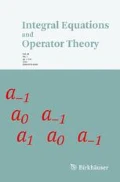Abstract.
If \(T = U\mid T\mid\) denotes the polar decomposition of a bounded linear operator T, then the Aluthge transform of T is defined to be the operator \(\tilde{T} = {\mid}T{\mid}^\frac{1}{2}U {\mid}T{\mid}^\frac{1}{2}\). In this note we study the relationship between the Aluthge transform and the class of complex symmetric operators (T iscomplex symmetric if there exists a conjugate-linear, isometric involution \(C : {\mathcal{H}} \rightarrow {\mathcal{H}}\) so that T = CT*C). In this note we prove that: (1) the Aluthge transform of a complex symmetric operator is complex symmetric, (2) if T is complex symmetric, then \((\tilde{T})^*\) and \(\widetilde{(T^*)}\) are unitarily equivalent, (3) if T is complex symmetric, then \(\tilde{T} = T\) if and only if T is normal, (4) \(\tilde{T} = 0\) if and only if T 2 = 0, and (5) every operator which satisfies T 2 = 0 is necessarily complex symmetric.
Similar content being viewed by others
Author information
Authors and Affiliations
Corresponding author
Additional information
This work partially supported by National Science Foundation Grant DMS 0638789.
Rights and permissions
About this article
Cite this article
Garcia, S.R. Aluthge Transforms of Complex Symmetric Operators. Integr. equ. oper. theory 60, 357–367 (2008). https://doi.org/10.1007/s00020-008-1564-y
Received:
Revised:
Published:
Issue Date:
DOI: https://doi.org/10.1007/s00020-008-1564-y


